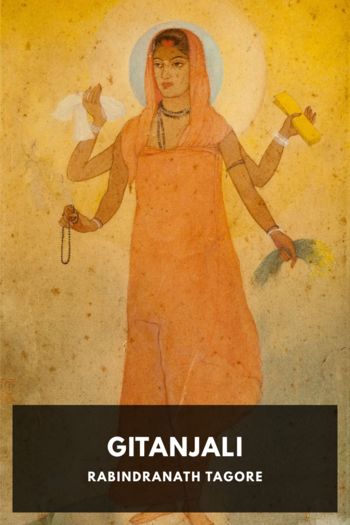My Reminiscences, Rabindranath Tagore [famous ebook reader .TXT] 📗

- Author: Rabindranath Tagore
Book online «My Reminiscences, Rabindranath Tagore [famous ebook reader .TXT] 📗». Author Rabindranath Tagore
We had a profusely decorated volume of Moore’s Irish Melodies: and often have I listened to the enraptured recitation of these by Akshay Babu. The poems combined with the pictorial designs to conjure up for me a dream picture of the Ireland of old. I had not then actually heard the original tunes, but had sung these Irish Melodies to myself to the accompaniment of the harps in the pictures. I longed to hear the real tunes, to learn them, and sing them to Akshay Babu. Some longings unfortunately do get fulfilled in this life, and die in the process. When I went to England I did hear some of the Irish Melodies sung, and learnt them too, but that put an end to my keenness to learn more. They were simple, mournful and sweet, but they somehow did not fit in with the silent melody of the harp which filled the halls of the Old Ireland of my dreams.
When I came back home I sung the Irish melodies I had learnt to my people. “What is the matter with Rabi’s voice?” they exclaimed. “How funny and foreign it sounds!” They even felt my speaking voice had changed its tone.
From this mixed cultivation of foreign and native melody was born the Valmiki Pratibha.45 The tunes in this musical drama are mostly Indian, but they have been dragged out of their classic dignity; that which soared in the sky was taught to run on the earth. Those who have seen and heard it performed will, I trust, bear witness that the harnessing of Indian melodic modes to the service of the drama has proved neither derogatory nor futile. This conjunction is the only special feature of Valmiki Pratibha. The pleasing task of loosening the chains of melodic forms and making them adaptable to a variety of treatment completely engrossed me.
Several of the songs of Valmiki Pratibha were set to tunes originally severely classic in mode; some of the tunes were composed by my brother Jyotirindra; a few were adapted from European sources. The Telena46 style of Indian modes specially lends itself to dramatic purposes and has been frequently utilized in this work. Two English tunes served for the drinking songs of the robber band, and an Irish melody for the lament of the wood nymphs.
Valmiki Pratibha is not a composition which will bear being read. Its significance is lost if it is not heard sung and seen acted. It is not what Europeans call an “Opera,” but a little drama set to music. That is to say, it is not primarily a musical composition. Very few of the songs are important or attractive by themselves; they all serve merely as the musical text of the play.
Before I went to England we occasionally used to have gatherings of literary men in our house, at which music, recitations and light refreshments were served up. After my return one more such gathering was held, which happened to be the last. It was for an entertainment in this connection that the Valmiki Pratibha was composed. I played Valmiki and my niece, Pratibha, took the part of Saraswati—which bit of history remains recorded in the name.
I had read in some work of Herbert Spencer’s that speech takes on tuneful inflections whenever emotion comes into play. It is a fact that the tone or tune is as important to us as the spoken word for the expression of anger, sorrow, joy and wonder. Spencer’s idea that, through a development of these emotional modulations of voice, man found music, appealed to me. Why should it not do, I thought to myself, to act a drama in a kind of recitative based on this idea. The Kathakas47 of our country attempt this to some extent, for they frequently break into a chant which, however, stops short of full melodic form. As blank verse is more elastic than rhymed, so such chanting, though not devoid of rhythm, can more freely adapt itself to the emotional interpretation of the text, because it does not attempt to conform to the more rigorous canons of tune and time required by a regular melodic composition. The expression of feeling being the object, these deficiencies in regard to form do not jar on the hearer.
Encouraged by the success of this new line taken in the Valmiki Pratibha, I composed another musical play of the same class. It was called the Kal Mrigaya, The Fateful Hunt. The plot was based on the story of the accidental killing of the blind hermit’s only son by King Dasaratha. It was played on a stage erected on our roof-terrace, and the audience seemed profoundly moved by its pathos. Afterwards, much of it was, with slight changes, incorporated in the Valmiki Pratibha, and this play ceased to be separately published in my works.
Long afterwards, I composed a third musical play, Mayar Khela, the Play of Maya, an operetta of a different type. In this the songs were important, not the drama. In the others a series of dramatic situations were strung on a thread of melody; this was a garland of songs with just a thread of dramatic plot running through. The play of feeling, and not action, was its special feature. In point of fact I was, while composing it, saturated with the mood of song.
The enthusiasm which went to the making of Valmiki Pratibha and Kal Mrigaya I have never felt for any other work of mine. In these two the creative musical impulse of the time found expression.
My brother, Jyotirindra, was engaged the livelong day at his piano, refashioning the classic melodic forms at his pleasure. And, at every turn of





Comments (0)